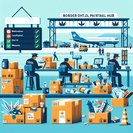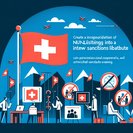
The Federal Department of Foreign Affairs (FDFA) confirmed on 11 November 2025 that Federal Councillor **Ignazio Cassis** will travel to Berlin on 13-14 November for meetings with German Foreign Minister Johann Wadephul and Development Minister Reem Alabali Radovan. While the agenda features geopolitical hotspots such as Ukraine and Gaza, Swiss officials say European policy and the practical implementation of the **Schengen Entry/Exit System (EES)** will dominate the bilateral discussions.
Germany is Switzerland’s largest trading partner and the main source of the **65,000 daily cross-border commuters** who travel from Baden-Württemberg and Bavaria into northern Switzerland. Both governments are eager to avoid bottlenecks when full biometric border checks under EES begin at Basel/Weil-am-Rhein and the Zurich main station coach terminal next spring. Cassis is expected to press Berlin for real-time data-sharing agreements and additional German staffing at jointly-operated border posts.
![Foreign Minister Ignazio Cassis Heads to Berlin for Talks on European Policy and Cross-Border Mobility]()
Another item on the table is the draft Swiss-EU institutional package unveiled the same day in Bern. Swiss diplomats will use the Berlin visit to gauge German support for fast-tracking the deal through EU structures—vital if Berne hopes to sign before next summer’s Swiss referendum window. For corporate mobility programmes the stakes are high: a smooth roll-out of EES and an institutional accord would cut wait times for business travellers at land borders and provide long-term regulatory certainty for intra-EU staff moves.
Business travel suppliers are watching closely. Lufthansa Group airlines (including SWISS) fear that any mis-coordination could lengthen connection times at Zurich and Frankfurt, undermining the groups’ hub-and-spoke model. Meanwhile the Swiss-German Chamber of Commerce is lobbying both governments to issue joint guidance for companies that routinely send technicians on same-day assignments across the Rhine, ensuring that passport scans and EES registration can be completed off-peak.
Mobility managers should monitor the Berlin talks for concrete deliverables: 1) a Swiss-German technical working group on EES, 2) commitments to maintain the current **COVID-era telework tax tolerance** while the permanent 40 % rule awaits ratification, and 3) an update on rail capacity increases on the Zurich-Stuttgart corridor, which many firms now use as a low-carbon alternative to short-haul flights.
Germany is Switzerland’s largest trading partner and the main source of the **65,000 daily cross-border commuters** who travel from Baden-Württemberg and Bavaria into northern Switzerland. Both governments are eager to avoid bottlenecks when full biometric border checks under EES begin at Basel/Weil-am-Rhein and the Zurich main station coach terminal next spring. Cassis is expected to press Berlin for real-time data-sharing agreements and additional German staffing at jointly-operated border posts.

Another item on the table is the draft Swiss-EU institutional package unveiled the same day in Bern. Swiss diplomats will use the Berlin visit to gauge German support for fast-tracking the deal through EU structures—vital if Berne hopes to sign before next summer’s Swiss referendum window. For corporate mobility programmes the stakes are high: a smooth roll-out of EES and an institutional accord would cut wait times for business travellers at land borders and provide long-term regulatory certainty for intra-EU staff moves.
Business travel suppliers are watching closely. Lufthansa Group airlines (including SWISS) fear that any mis-coordination could lengthen connection times at Zurich and Frankfurt, undermining the groups’ hub-and-spoke model. Meanwhile the Swiss-German Chamber of Commerce is lobbying both governments to issue joint guidance for companies that routinely send technicians on same-day assignments across the Rhine, ensuring that passport scans and EES registration can be completed off-peak.
Mobility managers should monitor the Berlin talks for concrete deliverables: 1) a Swiss-German technical working group on EES, 2) commitments to maintain the current **COVID-era telework tax tolerance** while the permanent 40 % rule awaits ratification, and 3) an update on rail capacity increases on the Zurich-Stuttgart corridor, which many firms now use as a low-carbon alternative to short-haul flights.










